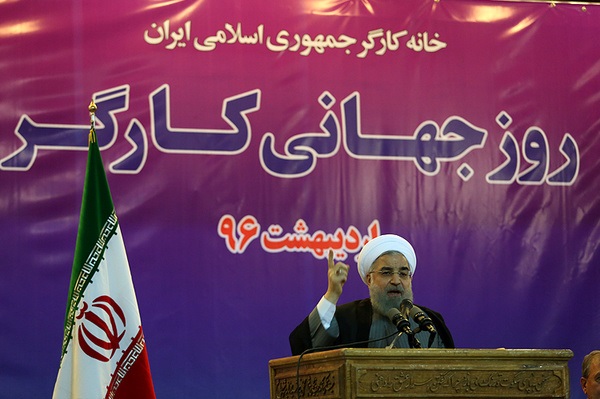London – Iran’s Hassan Rouhani chose Ruhollah Khomeini’s shrine as a platform for his May 1 Labor Day rally. Unexpectedly, the president seeking reelection was met with an angry crowd repeating slogans slamming his policy.
The laborers demanded an improvement of their living conditions and the repeal of a highly contentious labor bill from parliament.
Rouhani’s campaign management gathered over 30,000 Tehran workers on Labor Day. According to Iranian news agencies, Rouhani’s speech promising improving the lives of workers was booed and hissed at, as complaints rose that his administration overlooked the demands of the working class.
“Those who ignore labor force problems do not understand the reality of the situation,” Rouhani said, while stressing that Iran is facing two choices for settling internal crises.
The first is a passive one made of “slogans and promises” and the other is an active plan pivoted on “perceiving the status quo and working on projects that improve living conditions.”
On one hand, pro-Rouhani Iranian Labor News Agency (ILNA) described those opposing the president at his rallies as “saboteurs.”
On the other hand, Revolutionary Guard conservative mouthpiece “Fars” said that workers’ contempt was a reflection of deteriorating living conditions and the performance of Rouhani’s government.
Religious leader Naser Makarem Shirazi protested the content and moderating job done on nationwide televised debates between presidential candidates. He called on rivals to refrain from telling lies in their attempt to sway the public opinion.
Earlier, Supreme Leader Ali Khamenei made comments that appeared to favor hardline candidates in the May 19 presidential elections. He played down the benefits of “moderate” Rouhani’s agreement to curb Iran’s nuclear activities in return for a lifting of international sanctions.
Khamenei and his hardline supporters also criticized the nuclear deal – which stifled talk by Washington of possible military action against Iran – for failing to deliver promised economic benefits.
One of Rouhani’s main challengers, Ebrahim Raisi, an influential cleric with decades of experience in the hardline judiciary, said Iran had no need of foreign help to improve the economy and could always defend itself.
